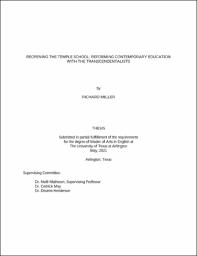
ATTENTION: The works hosted here are being migrated to a new repository that will consolidate resources, improve discoverability, and better show UTA's research impact on the global community. We will update authors as the migration progresses. Please see MavMatrix for more information.
Show simple item record
| dc.contributor.advisor | Matheson, Neill | |
| dc.creator | Miller, Richard Evan | |
| dc.date.accessioned | 2021-06-01T18:30:00Z | |
| dc.date.available | 2021-06-01T18:30:00Z | |
| dc.date.created | 2021-05 | |
| dc.date.issued | 2021-05-03 | |
| dc.date.submitted | May 2021 | |
| dc.identifier.uri | http://hdl.handle.net/10106/29806 | |
| dc.description.abstract | A conversation surrounding reform in American education has been in play for two centuries. In 1834, Bronson Alcott’s Temple School challenged traditional modes of education with his conversational approach in the classroom. His methods encouraged students to self-reflect on their relationship to nature, rather than conform to a standardized knowledge system common in public schools. Elizabeth Palmer Peabody, his Transcendentalist contemporary and teaching assistant, published her Record of a School in 1835 to record Alcott’s interactions with students and display to the public the effectiveness of their reformed approach to education. Fast-forward to the current climate in America, and one finds an educational culture where standardized learning dominates the scene, influencing reform policies and setting utopic expectations for public educators who must adapt instruction to appease the state, stifling their creativity and preventing a self-reflective, holistic model that would better meet each individual student. In the midst of this reform problem, this thesis proposes that by approaching education through the lens of these Transcendental reformers of the 19th-century, then contemporary perceptions of educational reform can be challenged and reimagined. Chapter One looks at the daily procedures of the Temple School in Peabody’s Record and discovers that progressive methods of pedagogy not dependent on standardized structures prove impactful to student development. In the second chapter, Alcott’s less popular essay “The Doctrine and Discipline of Human Culture” is read in conjunction with a larger Transcendental text, Thoreau’s “Civil Disobedience,” as a means of re-thinking federal reform practice in education. The project concludes by re-contextualizing Alcott’s legacy in education through the way his work was depicted by the two leading women in his life: Peabody, and his daughter, Louisa May. Their work challenges both social and gender expectations for reform practice, influencing the way we perceive the cultivation of students as holistic individuals. | |
| dc.format.mimetype | application/pdf | |
| dc.language.iso | en_US | |
| dc.subject | Alcott | |
| dc.subject | Peabody | |
| dc.subject | Transcendentalists | |
| dc.subject | Education | |
| dc.subject | Reform | |
| dc.subject | Pedagogy | |
| dc.subject | Standardized | |
| dc.subject | Learning | |
| dc.subject | Temple school | |
| dc.subject | Legacy | |
| dc.title | REOPENING THE TEMPLE SCHOOL: REFORMING CONTEMPORARY EDUCATION WITH THE TRANSCENDENTALISTS | |
| dc.type | Thesis | |
| dc.degree.department | English | |
| dc.degree.name | Master of Arts in English | |
| dc.date.updated | 2021-06-01T18:30:01Z | |
| thesis.degree.department | English | |
| thesis.degree.grantor | The University of Texas at Arlington | |
| thesis.degree.level | Masters | |
| thesis.degree.name | Master of Arts in English | |
| dc.type.material | text | |
Files in this item
- Name:
- MILLER-THESIS-2021.pdf
- Size:
- 496.4Kb
- Format:
- PDF
This item appears in the following Collection(s)
Show simple item record


